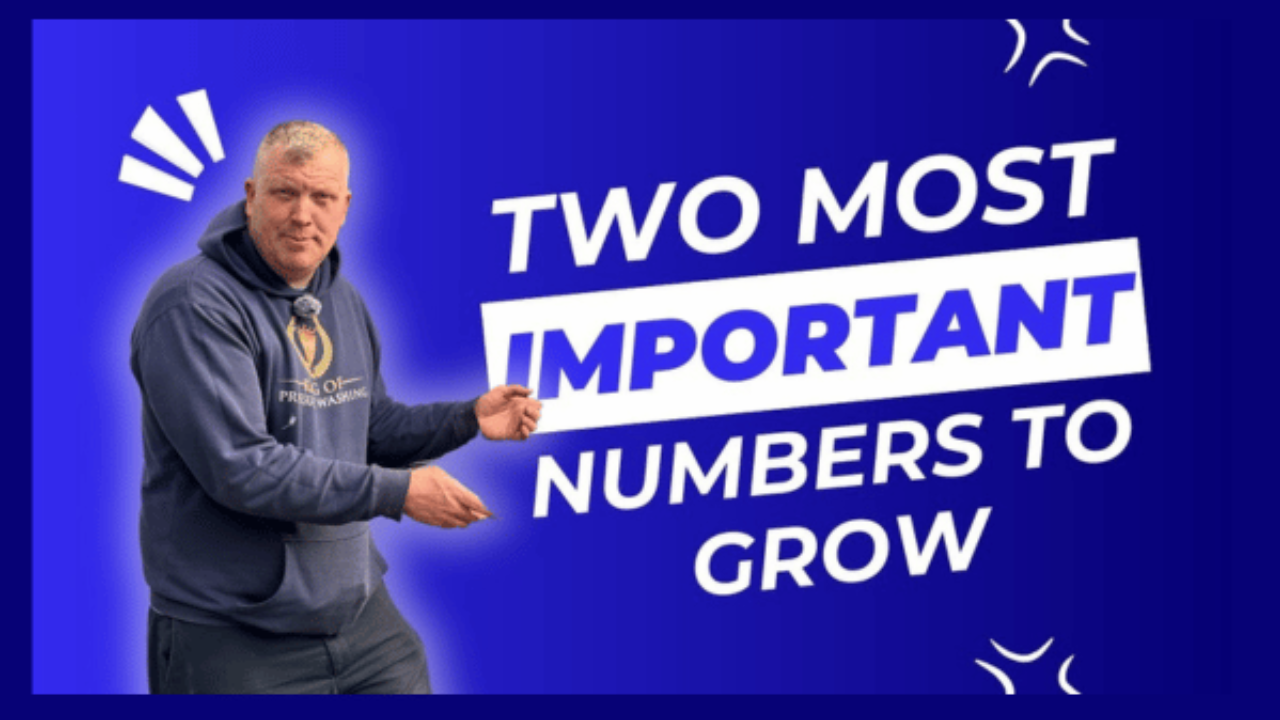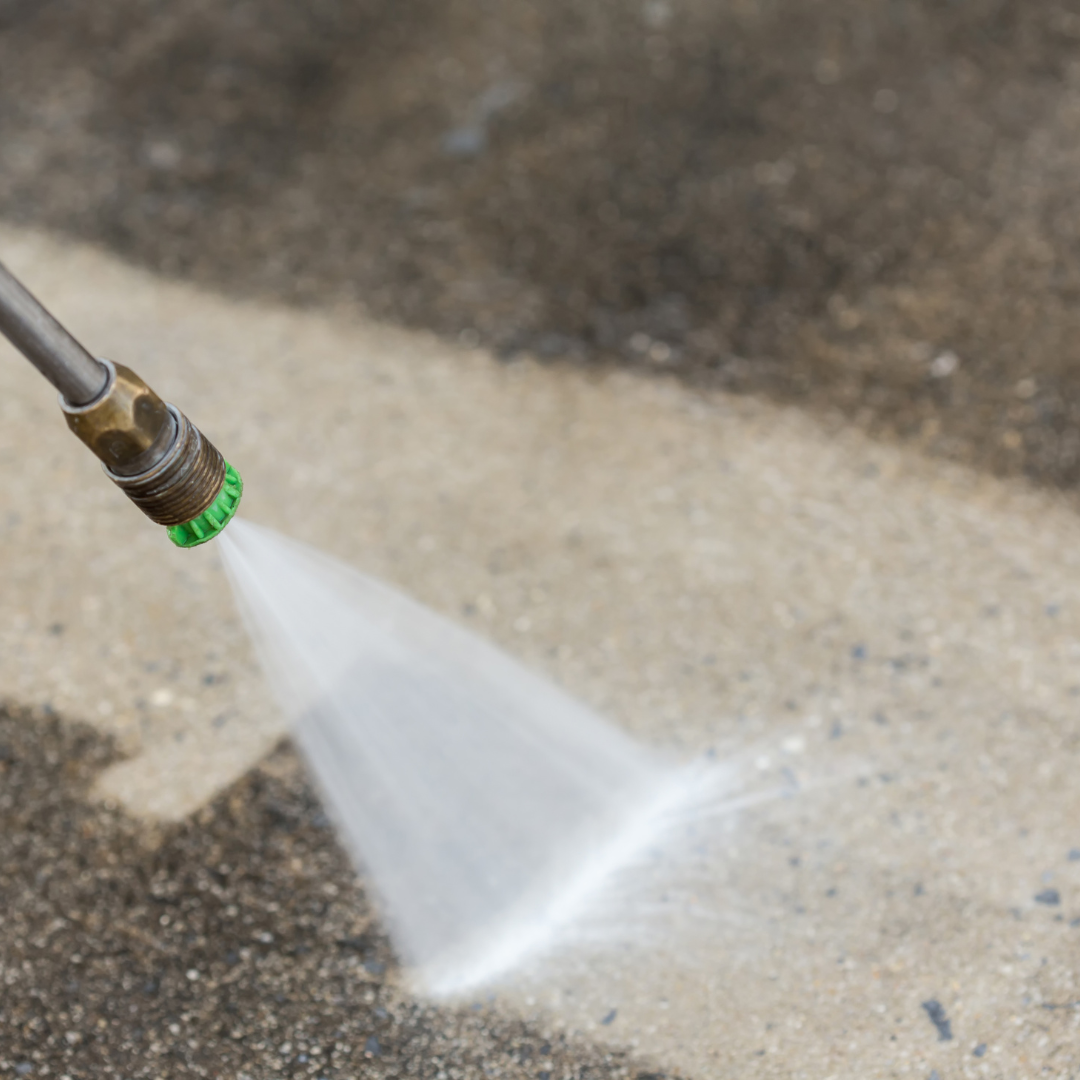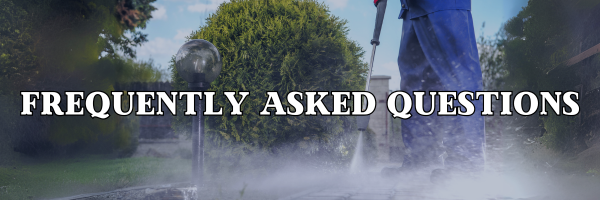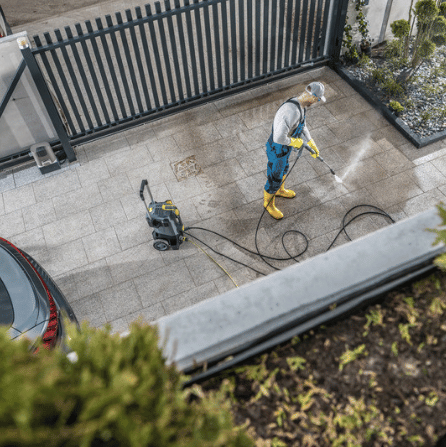Double Your Pressure Washing Profits: The 2 Numbers You Can’t Ignore!
Feb 24, 2025
In the competitive world of pressure washing, many business owners focus extensively on the technical aspects—learning about equipment, chemicals, and cleaning techniques. While these skills are undoubtedly important, they're not what separates successful businesses from those that struggle. The real difference lies in understanding the business side of your pressure washing operation.
As someone who has coached countless pressure washing entrepreneurs to six and seven-figure businesses, I've identified two critical numbers that will dramatically impact your growth potential. These aren't complicated metrics requiring advanced accounting knowledge—they're straightforward numbers that anyone can track and improve.
The Two Numbers That Will Transform Your Business
The two most important numbers you need to monitor consistently are:
1. **Average Ticket Value**
2. **Close Rate**
Let's dive deep into why these metrics matter so much and how improving them can completely transform your pressure washing business.
Average Ticket Value: The Key to Working Less While Earning More
Your average ticket is simply the total revenue divided by the number of jobs completed. For instance, if you completed 40 jobs this month and generated $32,000 in revenue, your average ticket is $800.
Many pressure washing business owners casually estimate their average ticket: "It's between $600 and $1,000." But this vague approximation indicates you don't truly know your numbers. When you calculate it precisely, you'll likely find it's either significantly higher or lower than you thought.
What Should Your Pressure Washing Average Ticket Be?
For pressure washing services, your average ticket should be **at least $800 to $1,200**. If your average is below this threshold, you're leaving significant money on the table and working harder than necessary.
I've coached pressure washing businesses who built operations with average tickets exceeding $1,400 on residential projects alone. This didn't come from occasional commercial whale projects—it came from strategic pricing and bundling of services.
Why Higher Average Tickets Matter
When you increase your average ticket, you can:
1. **Work less while maintaining or increasing revenue**. Completing 30 jobs at $1,000 each generates more revenue than 60 jobs at $450 each—with half the travel time, setup/teardown, and administrative work.
2. **Reduce overhead costs**. Fewer jobs mean lower fuel costs, less equipment wear and tear, and reduced chemical expenses.
3. **Lower your risk profile**. Every pressure washing job carries inherent risks—from property damage to slip hazards. By doing fewer, higher-value jobs, you reduce your overall exposure to these risks.
4. **Create more time for high-value activities**. With fewer jobs on your schedule, you gain time for business development, marketing, and strategic planning.
5. **Deal with fewer problem customers**. The 80/20 rule applies perfectly here—20% of customers typically create 80% of headaches. Fewer total customers mean fewer problem customers.
How to Increase Your Average Ticket
Here are proven strategies to boost your average ticket value:
1. Bundle Services Strategically
Instead of offering just a house wash, create comprehensive packages that include:
- House washing (30-35 cents per square foot)
- Driveway cleaning (30-35 cents per square foot)
- Deck cleaning ($2 per square foot)
- Exterior window cleaning (minimum $200-300)
When you present these as cohesive packages rather than à la carte options, customers perceive greater value and are more likely to spend more.
2. Implement Tier Pricing
Create three distinct service tiers:
- **Good**: Basic cleaning package (house wash only)
- **Better**: Enhanced package with added features (house wash + driveway)
- **Best**: Premium comprehensive package (house wash + driveway + deck + windows)
This pricing psychology works because most customers will select the middle option—which should be priced significantly higher than your current average ticket.
3. Focus on Value, Not Price
When customers understand the value they're receiving—thorough cleaning, proper techniques, premium chemicals, damage prevention—they're willing to pay more. Communicate this value clearly during sales conversations.
One pressure washer I coached increased his average ticket by 35% simply by restructuring his packages and focusing his sales pitch on the premium experience rather than the basic service.
Close Rate: Finding Your Sweet Spot
Your close rate is the percentage of quotes that convert to paying jobs. It's calculated by dividing the number of jobs won by the total number of quotes provided.
Many pressure washing businesses are proud of their high close rates—90% or higher—but this is actually a warning sign. A close rate that high typically means your prices are too low.
The Ideal Close Rate for Pressure Washing
For pressure washing services, your optimal close rate should be between **30% and 50%**. This might seem counterintuitive, but it's based on a fundamental business principle: you don't want or need every potential customer.
A 30-50% close rate indicates that:
1. Your prices reflect the professional value you provide
2. You're targeting the right customer segment (those who value quality over bargain pricing)
3. You're not competing solely on price with low-quality providers
The Relationship Between Close Rate and Pricing
There's an inverse relationship between your close rate and your prices. As you raise prices, your close rate will naturally decrease—but your profitability will increase if you find the right balance.
Consider this example:
- **Scenario A**: 90% close rate with a $400 average ticket = $36,000 revenue from 100 quotes
- **Scenario B**: 45% close rate with an $800 average ticket = $36,000 revenue from 100 quotes
Both scenarios generate the same revenue, but Scenario B requires half the work (45 jobs vs. 90 jobs), reducing operational costs and decreasing risk exposure for far greater profitability and sustainability.
Why You Shouldn't Chase Every Customer
The 80/20 principle applies powerfully here: 20% of customers typically provide 80% of your revenue—and they're usually your highest-paying, least problematic clients.
By pricing strategically to target this top 20%, you:
1. Work with clients who truly value your expertise
2. Reduce headaches from price-sensitive customers
3. Create a sustainable business model that doesn't burn you out
4. Build a reputation as a premium service provider
How to Optimize Your Close Rate
To reach that 30-50% sweet spot:
1. Gradual Price Increases
If your close rate exceeds 50%, systematically increase your prices until you reach the optimal range. This doesn't mean arbitrary price hikes—it means aligning your pricing with the professional value you provide.
2. Improve Your Sales Approach
When quoting higher prices, your sales approach becomes more important. Focus on:
- Understanding client needs through thoughtful questioning
- Educating prospects about the value differences between quality pressure washing and budget options
- Creating visual proposals that showcase your professional approach
- Emphasizing proper techniques, chemical knowledge, and property protection
3. Target Higher-Value Neighborhoods
Your marketing efforts should focus on neighborhoods and areas where homeowners have both the means and desire for professional pressure washing services. This strategic targeting naturally aligns your close rate with the right customer base.
Tracking and Improving These Metrics
Knowing these numbers is just the starting point—you need to actively track and work to improve them.
Regular Monitoring
Review your average ticket and close rate:
- Weekly during peak season
- Monthly year-round
- Quarterly for trend analysis
- Annually for strategic planning
Most CRM systems can generate these reports automatically. If yours doesn't, create a simple spreadsheet to track:
- Quote date
- Quote amount
- Whether it converted to a sale
- Final invoice amount
Setting Improvement Targets
Once you know your current metrics, set specific improvement goals:
- "Increase average ticket from $600 to $800 this season"
- "Adjust close rate from 70% to 40% while increasing average ticket by 30%"
These concrete targets give you something to work toward and measure your progress against.
Seasonal Analysis
Compare your metrics across different seasons and years. This historical data helps you:
- Identify which months have the highest potential for premium sales
- Recognize when you need to adjust pricing or marketing strategies
- Plan your resources more effectively for busier periods
The data might reveal, for example, that March through May are your strongest months, while July and August see a decline. This information allows you to focus your commercial marketing efforts during slower residential periods.
The 80/20 Rule in Pressure Washing
The Pareto Principle (80/20 rule) applies powerfully to pressure washing:
- 20% of your customers generate 80% of your revenue
- 20% of your customers create 80% of your problems
- 20% of your marketing efforts produce 80% of your leads
By understanding this principle, you can focus your energy on the clients, services, and marketing channels that deliver the greatest return.
Following Up: The Difference Between Success and Failure
One final critical point: follow-up is essential to converting premium customers. The saying "If you don't follow up, you'll fold up" is absolutely true in this business.
Implement a systematic follow-up process:
- Send text messages to check decision status
- Make phone calls to answer any questions
- Provide additional information that addresses specific concerns
- Follow up with past customers to secure repeat business
One pressure washer generated $18,000 in additional revenue simply by sending 50 text messages to past customers—a five-minute task that yielded significant returns.
The Five Around Method
When working in a neighborhood, implement the "five around" method to generate additional leads:
1. After completing a job, visit the two neighboring houses on each side
2. Visit three houses across the street
3. Leave door hangers or, better yet, knock on doors and personally introduce yourself
This simple technique can dramatically increase your job density without additional marketing costs.
Commercial Work: The Path to Sustainable Growth
While residential work forms the backbone of many pressure washing businesses, commercial contracts offer more stable revenue and higher average tickets. Consider these approaches:
- Cold calling 25 businesses per day
- Joining the Chamber of Commerce and industry associations
- Using LinkedIn to connect with property managers
- Cold email marketing to building owners
Commercial work typically has a lower close rate (10-20%) but much higher ticket values, making it worth the additional effort to secure these contracts.
Building a Sustainable Pressure Washing Business
The path to a profitable, sustainable pressure washing business isn't through working harder—it's through working smarter by understanding and optimizing these two critical numbers.
When you increase your average ticket value while maintaining a strategic close rate, you create a business model that:
1. Maximizes your profit per hour worked
2. Reduces physical strain and burnout risk
3. Positions you as a premium service provider
4. Creates a sustainable growth trajectory
Remember: Don't compete on price; compete on value. The customers worth having will recognize and pay for the difference.
What are the two most important numbers I should track in my pressure washing business?
The two most critical numbers every pressure washing business should track are your average ticket value and your close rate. Your average ticket is the total revenue divided by the number of jobs completed, while your close rate is the percentage of quotes that convert to paying jobs. Together, these metrics provide powerful insights into your business's health and growth potential.
What should my average ticket be for pressure washing services?
For a profitable pressure washing business, your average ticket should be between $800 and $1,200. Many successful operators maintain average tickets exceeding $1,400 for residential projects. If your average ticket is below $800, you're likely leaving significant money on the table and working harder than necessary to achieve your revenue goals. Proper pricing (30-35 cents per square foot for house washing, $2 per square foot for deck cleaning) and service bundling can help you reach these targets.
My close rate is over 90% - isn't that a good thing?
While a high close rate might seem positive, a close rate of 90% typically indicates your prices are too low. For pressure washing services, the optimal close rate should be between 30-50%. This range shows you're targeting the right customer segment (those who value quality over bargain pricing) and charging appropriately for the professional service you provide. If your close rate is consistently above 50%, it's time to raise your prices.
How can I increase my average ticket value in pressure washing?
You can increase your average ticket by:
- Bundling services (combining house washing with driveway cleaning, deck cleaning, and window cleaning)
- Implementing tier pricing (good, better, best options)
- Charging appropriately for premium services (30-35 cents per square foot for house wash and driveway)
- Adding high-value services like exterior window cleaning (minimum $200-300)
- Focusing your sales pitch on value rather than price
- Offering comprehensive packages rather than à la carte options
Won't raising my prices drive away customers?
Yes, raising prices will reduce your close rate—and that's actually the goal. By finding the right balance between price and close rate, you'll work with fewer, higher-quality customers who value your expertise. This allows you to do less work for the same or better revenue while reducing overhead costs, minimizing risk exposure, and creating more time for high-value business activities. Remember that in Scenario A (90% close rate with $400 average ticket) and Scenario B (45% close rate with $800 average ticket), you generate the same revenue but do half the work in Scenario B.
What is the "Five Around Method" and how can it help my business?
The "Five Around Method" is a lead generation technique where after completing a job, you target the five closest neighboring houses: two houses on each side of your customer's property and three houses across the street. You can either leave door hangers or, more effectively, knock on doors to personally introduce yourself and your service. This method leverages your existing presence in a neighborhood to generate additional leads without additional marketing costs, increasing your job density and efficiency.
How do I balance residential and commercial pressure washing work?
While residential work forms the backbone of many pressure washing businesses, commercial contracts offer more stable revenue and higher average tickets. Commercial work typically has a lower close rate (10-20%) but much higher ticket values. To balance both, consider dedicating specific days to commercial prospecting (calling 25 businesses per day), joining the Chamber of Commerce, using LinkedIn to connect with property managers, and implementing cold email marketing. During seasonal residential slowdowns (like July-August), increase your focus on commercial opportunities.
How often should I review my business metrics?
You should review your average ticket and close rate:
- Weekly during peak season
- Monthly year-round
- Quarterly for trend analysis
- Annually for strategic planning
Regular monitoring helps you identify trends, set improvement targets, and make data-driven decisions about pricing and marketing strategies. Most CRM systems can generate these reports automatically, but even a simple spreadsheet can help you track these critical numbers.
How does the 80/20 rule apply to my pressure washing business?
The 80/20 rule (Pareto Principle) applies powerfully to pressure washing:
- 20% of your customers generate 80% of your revenue
- 20% of your customers create 80% of your problems
- 20% of your marketing efforts produce 80% of your leads
By understanding this principle, you can focus your energy on the clients, services, and marketing channels that deliver the greatest return. This might mean targeting specific neighborhoods, offering particular high-value services, or doubling down on your most effective marketing channels.
Why is follow-up so important in pressure washing sales?
Follow-up is absolutely critical to converting prospects into customers. Without systematic follow-up, you're leaving significant money on the table. Many pressure washing businesses fail to follow up on quotes or reconnect with past customers, essentially burning money. Implement a process that includes text messages, phone calls, and emails to check decision status and address specific concerns. One pressure washer generated $18,000 in additional revenue simply by sending 50 text messages to past customers—a five-minute task with significant returns. Remember the saying: "If you don't follow up, you'll fold up."






